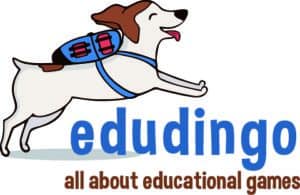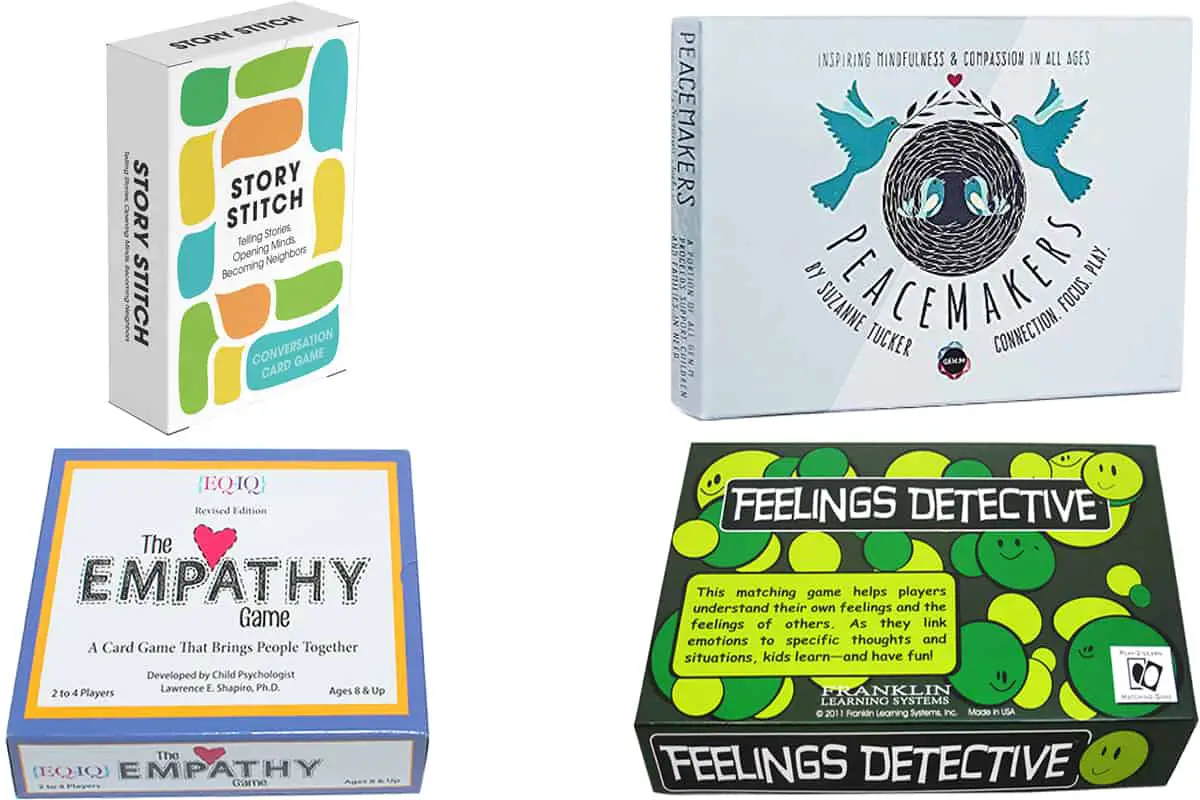This post contains affiliate links.
Card games can be a great way to teach empathy to kids at home or at school. Understanding how other people feel is an important life skill. I made this post to guide you through the possibilities.
So what are the available empathy card games for Kids? I found 7 card games designed to teach empathy to children. I particularly recommend:
- For Preschool Children, Peacemakers, which mixes empathy-building with mindfulness inspired principles
- For Elementary School Children, The Empathy Game which really involves children and builds up empathy between them
- For Middle School Children, Story Stitch which helps integrate immigrants and refugees into their new neighborhoods
This table summarizes some characteristics of the 4 games I recommend:
| Game | Age | Price | Players | For | Rating |
|---|---|---|---|---|---|
| Peacemakers | 3-10 | $$$ | 2-20 | Home, School, Therapy | ★★★★☆ |
| Feelings detective | 6-12 | $$$ | 2-4 | Therapy | ★★★☆☆ |
| The Empathy Game | 8+ | $$$ | 2-4 | Therapy, Counseling | ★★★★★ |
| Story Stitch | 12+ | $$ | 4-10 | School, Oorganizations | ★★★★☆ |
Empathy Card Games for Preschool & Kindergarten
PeaceMakers (Generation Mindful – Gen:M)
★★★★☆
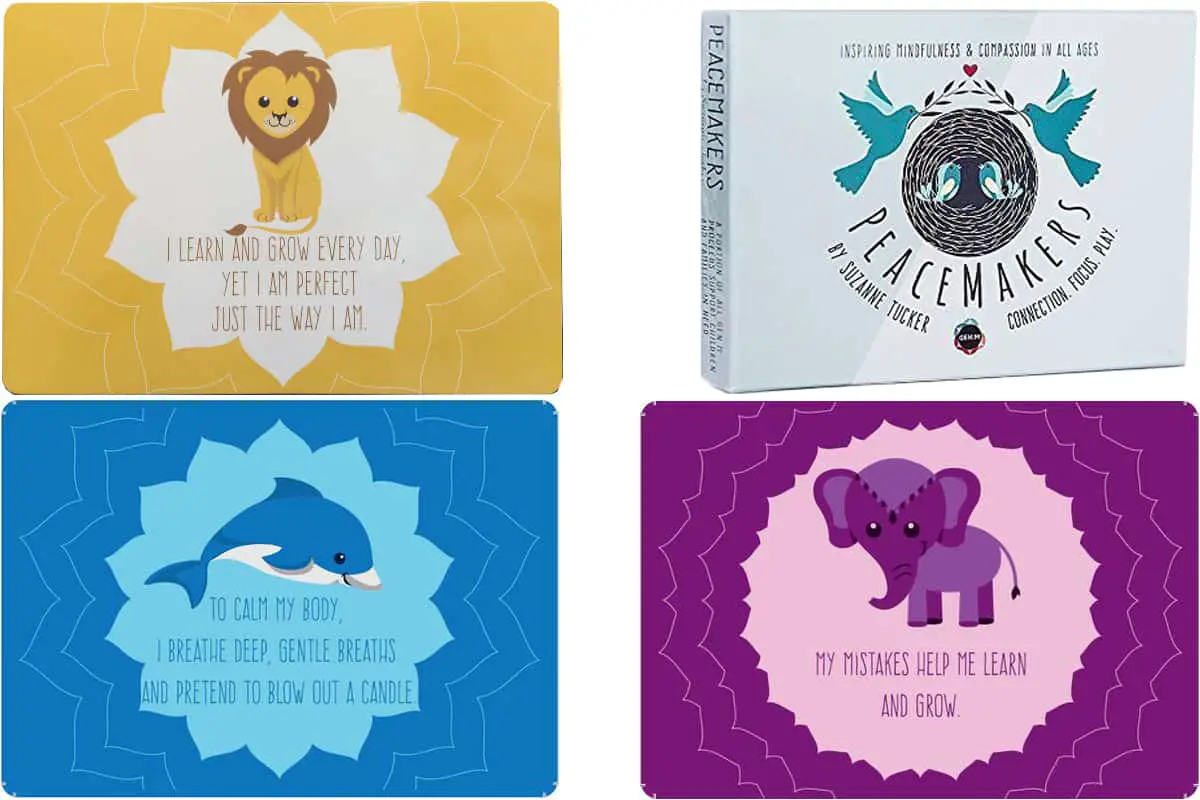
Age 3-10 | 2-20 Players | For Families, Teachers, Therapists
Duration: 10 minutes a day
PeaceMakers is a game with 45 large colorful cards: 10 cards to explain the game and its themes, and the 35 remaining divided into 7 themes (one color/animal per theme):
is a game with 45 large colorful cards: 10 cards to explain the game and its themes, and the 35 remaining divided into 7 themes (one color/animal per theme):
- Power
- Joy
- Balance
- Love
- Peace
- Intuition
- Forgiveness
These themes and the corresponding cards have statements aimed at practicing mindfulness (which has numerous benefits, including increasing empathy, reducing stress, improving attention and better managing emotions).
Each card is meant to trigger a discussion with the child (or children). You might ask questions about the chosen card’s statement, and listen to what the child has to say with an open mind. But there are other proposed uses as well.
I highly recommend Peacemakers which enables to introduce children to a different mindset and progress in social-emotional learning from an early age.
This video from Gen:M explains the approach and gives some testimonial:
Other preschool games:
- Super Me
 by Hoyle (4-6 Year-olds, 2-4 players) is a very simple “matching” game to match “emergency situations” with “Super Me” cards where the hero helps the person having the problem. Both types of cards are illustrated but do not have any text. Despite the publisher’s allegations, it does not teach empathy but to help others when they need it (in very obvious situations). I cannot recommend this game for empathy-building, but it actually is a good matching game (better than plain old memory).
by Hoyle (4-6 Year-olds, 2-4 players) is a very simple “matching” game to match “emergency situations” with “Super Me” cards where the hero helps the person having the problem. Both types of cards are illustrated but do not have any text. Despite the publisher’s allegations, it does not teach empathy but to help others when they need it (in very obvious situations). I cannot recommend this game for empathy-building, but it actually is a good matching game (better than plain old memory).
Empathy Card Games for Elementary School
The Empathy Game (Childswork Childsplay)
★★★★★
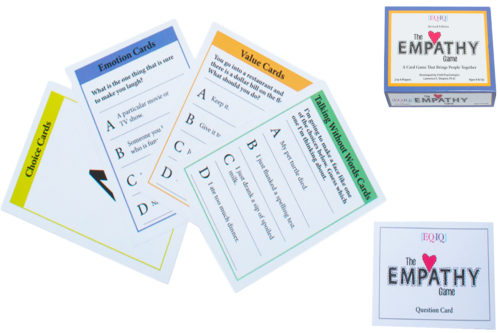
Age: 8+ | 2-4 Players | For Therapists, Counselors
Author: Lawrence Shapiro
The Empathy Game comprises 4 types of cards:
comprises 4 types of cards:
- 13 Emotion cards are multiple-choice questions that enable to better understand how the other players react emotionally.
For example:- How do you express anger?
A: By sulking.
B: By telling a person calmly how you feel.
C: By shouting.
D: By keeping your feelings to yourself.
- How do you express anger?
- 13 Value Cards are multiple-choice questions that relate to whether your values include being empathetic to others.
For example:- What would be most embarrassing for you?
A: Having someone open the bathroom door when you are in the toilet.
B: Being caught taking money from your parent’s dresser.
C: Someone finding out that you wanted a friend to be your boyfriend or girlfriend.
D: Being caught cheating on a test.
- What would be most embarrassing for you?
- 14 Talking Without Words Cards are cards where players mime a given emotion or feeling and the other players try to guess which one it is among four possibilities.
For example:- I’m going to make a face like one of the characters below. Guess which one I’m thinking about.
A: My pet turtle died.
B: I just failed a spelling test.
C: I just drank a sip of spoiled milk.
D: I ate too much dinner.
- I’m going to make a face like one of the characters below. Guess which one I’m thinking about.
- 16 Choice Cards enable each player to state which one of the multiple choices they choose (A, B, C or D)
To play, each player is dealt a set of A, B, C and D choice cards.
The other cards are shuffled and constitute a pile. At their turn, the first player draws a card from the pile.
- If it is an “Emotion Card” or a “Value Card”, the first player puts on the table facedown the choice card that best represents his/her answer.
- If it is a “Talking Without Words Card”, the player acts out their answer without speaking (by miming).
Then the other players also play a choice card facedown, trying to best guess what the first player answered. Each correctly guessed choice is awarded a point! The first player to get 10 points wins the game.
I recommend leaving time for discussion, especially to let each player explain their choices when they want to.
The game is very good. Its basic mechanism involves each player on a personal level, and each player feels recognized when other players succeed in guessing their feelings or choices correctly. This way, the potential competition between players that could arise because of the counting of points is neutralized by the “good feelings” when other players guess your responses.
Another interesting feature is that the game can be used to assess the level of emotional competence of each player (just by counting the points).
I highly recommend The Empathy Game for these reasons.
for these reasons.
I have a problem with this game though:
- There are only 40 Emotion/Value/Talking without talking cards. The game has low replayability. It is disappointing as empathy takes time to build, and I would like a game that you could play 10 times with the same children and see their progress.
- Besides, and because of this, there are no levels of progression. Empathy progresses by stages though, and the game would be vastly better if it included for example 3 levels of progression, each of them with 40 Emotion/Value/Talking without talking cards.
Feelings Detective (Franklin Learning Systems)
★★★☆☆
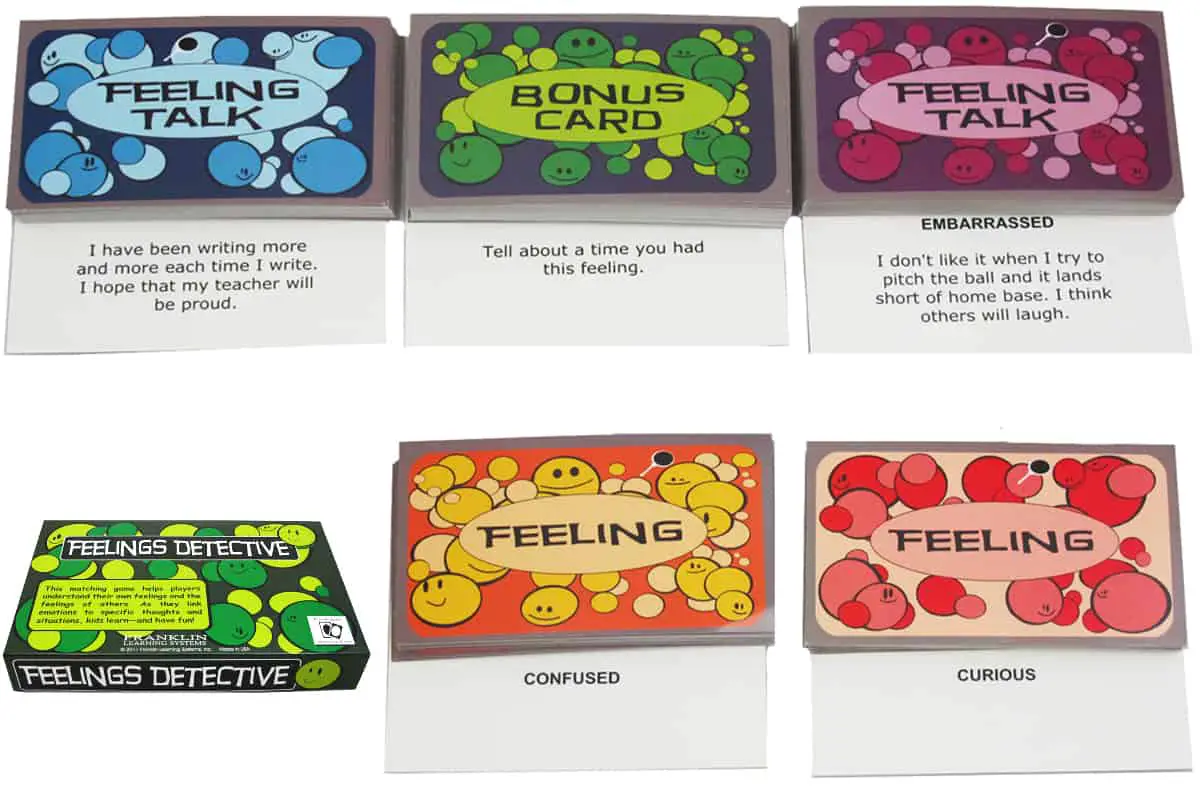
Age 6-12 | 2-4 Players | For Therapists
Duration: 20 to 45 minutes
Feelings Detective is a card game with 3 types of cards:
is a card game with 3 types of cards:
- Feeling cards have just one word (feeling/emotion) written on them, like “Confused”, “Curious”, “Happy”, “Frustrated”…
- Feeling Talk cards have an example of talk that reflects a specific feeling, plus sometimes the feeling itself. For example:
- I have been writing more and more each time I write. I hope that my teacher will be proud
- Embarrassed – I don’t like it when I try to pitch the ball and it lands short of home base. I think others will laugh.
- Bonus Cards (for example: “Tell about a time you had this feeling”) ask to give an example of the feeling or to describe the consequence of this feeling.
Each card group is divided into two difficulty levels by the color of their back (grades 1-3, grades 4-6).
The “Feeling” and “Feeling Talk” cards can be used as a matching game.
I recommend Feelings Detective because the idea to identify feelings through “feeling talk” is really relevant and a useful skill. You learn to look for cues (which are generally in the second sentence, the first one stating the situation).
Bear in mind that the degree of involvement of the players is rather low though (you are not guessing the real feeling of someone, but of a hypothetical person). This is OK for therapists or if you are good at adding some animation to the game.
Other games:
- HeartBeats by Kendra Lince Davis (age 10+, 2-6 Players). This series of cards with statements & questions has been created with troubled teens. They address various situations such as peer pressure, self-doubt, compassion, coping or dealing with authority – and encourage players to express their feelings and develop more empathy.
- Dr Playwell’s Caring About Others (ChildsWork ChildsPlay, age 6-12, 2 to 4 players) is a 52 card game (with a 12-sided die, and 12 additional activity cards), in which players have to understand how others feel and how to care about them to win.
Empathy Card Games for Middle School
Story Stitch
★★★★☆
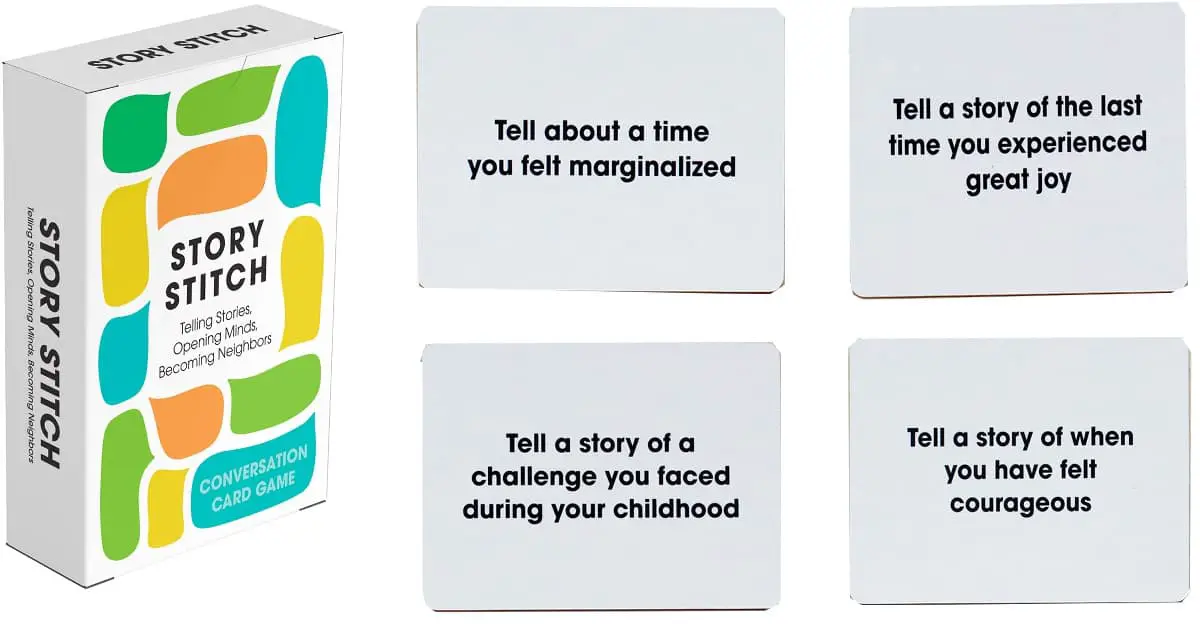
Story Stitch is an extremely well-designed game aimed at helping immigrants and refugees integrate into their new neighborhoods. It can be used with children 12-year-old and up. I have made a detailed description of the game in the post “14 Empathy Card Games for Grown-ups, Businesses, And Organizations “.
“.
Other Empathy Related Games
You can read the following posts on the Edudingo blog for the following topics related to empathy games:
Empathy Games:
- Empathy card games for adults: 14 Empathy Card Games for Grown-ups, Businesses, And Organizations

- Empathy board games: 10 Empathy Board Games for Schools, Families, and Organizations

- Nonviolent Communication (NVC) games: 10 NVC (Non-violent Communication) Card and Board Games

Feelings and Emotions Games for kids:
- Emotions games for preschoolers and kindergarten: 30+ Games About Emotions For Preschoolers And Kindergarten
 (most also apply to primary school children)
(most also apply to primary school children) - Feelings and emotions board games for kids: 9 Feelings and Emotions Board Games for Primary School and Home for the remaining games that you can you at primary school, but preferably have a look at the previous post first.
Edudingo.com is a participant in the Amazon Services LLC Associates Program, an affiliate advertising program designed to provide a means for sites to earn advertising fees by advertising and linking to Amazon.com. We also participate in other affiliate programs which compensate us for referring traffic.
